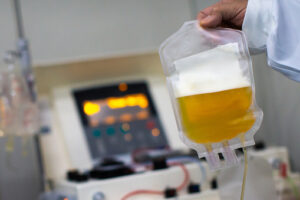Therapeutic plasma exchange (TPE) separates, removes and replaces a patient’s plasma with donor plasma and is commonly used for patients with antibody mediated rejection of allograft organs or autoimmune conditions. Since metabolites increase with age, researchers at Circulate Health and the Buck Institute for Aging explored the effects of plasma exchange on biological age. Many factors affect biological age, and the most accurate methods to calculate it include DNA methylation patterns combined with machine learning algorithms. In a small, exploratory randomized clinical trial to determine if TPE affects biological age, researchers randomized 42 patients over 60 years of age to receive either saline placebo, TPE one time per month for six months, or TPE or TPE plus intravenous injections of immunoglobin (IVIG) two times once a week each month for three months. Baseline and two longitudinal blood samples were collected during the study, and biological age was calculated using data from the patients’ clinical laboratory values, epigenomic, transcriptomic, proteomic, and metabolomic profiles. TPE was relatively safe (two patients experienced adverse reactions). After adjusting biological age for known covariates, researchers determined that patients who received TPE and IVIG had the greatest reduction in biological age at the one-month mark—2.6 years compared to the placebo group—and the greatest changes in multi-omic profiling, including changes in cellular and molecular responses, increased immune responses, modulation of proteins associated with chronic inflammation, and increased cellular senescence. Larger and longer studies are needed to better define the effect of TPE and IVIG on biological age.
Reference:

